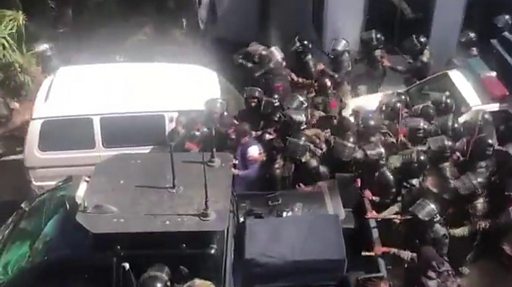A supporter of former Prime Minister Imran Khan throws tear gas during clashes with security forces in Karachi
The battle between Imran Khan’s supporters and Pakistan’s mighty military has raged this week on two fronts: in the streets and on social media. And on a battlefield, the former prime minister seems to have the upper hand.
Within hours of Imran Khan’s arrest on Tuesday, the Pakistani government cracked down on the country’s internet in a move to crack down on resistance.
The swashbuckling political leader’s capture immediately sparked nationwide protests.
In Lahore, Nighat Dad rushed home after hearing that Khan had been arrested. On leaving the office in the city centre, the lawyer’s staff had already begun to encounter violent protesters.
“A mob tried to attack their cars and prevent them from leaving,” he told the BBC.
As one of Pakistan’s leading digital rights activists, she was also keeping tabs on the discourse raging online.
Images of protesters throwing rocks into clouds of tear gas unrolled on social media and were broadcast to WhatsApp groups. The video of the arrest – Khan being overrun by paramilitary troops – has gone viral. His party, Pakistan Tehreek-e-Insaf (PTI), has been spitting out quick updates on its Twitter page.
To control the rapidly escalating situation, the government flipped the switch. Across the country, social media sites have declined: people have struggled to load Facebook, YouTube and Twitter.
Mobile networks were also blocked in places, resulting in a complete disruption of connectivity. Elsewhere, internet speeds have been throttled.
When the blackout came, it was not unexpected for most Pakistanis. Those who could, started their own VPNs: Demand for services that redirect a user’s Internet location has skyrocketed by 1,300%, the trackers later told the BBC. Those with mobile access continued on WhatsApp.
‘True News’ online
Shutting down the internet has become a familiar move in the authoritarian playbook, particularly in South Asia in recent years. Authorities are taking the country offline to control the flow of information and crack down on any dissent or protest, experts say.
“Governments have a hammer, and it’s easy to treat the internet like a nail,” says Kathik Nachiappan, a Singapore-based expert on South Asia.
People are getting more and more news online in Pakistan
In Pakistan, the move has particular impact because it shuts down what it considers the only place to get “real news” in the country: a decade of attacks on independent journalists and newspapers in the country by the military authorities are believed to have gagged the mainstream media.
Confidence that mainstream media will adequately inform the public has plummeted so much that people are going online to find out “what’s really going on,” says Uzair Younus, a Pakistani policy expert with The Atlantic Council, a U.S.-based think tank. .
“People say, ‘OK, television isn’t really worth watching, because the military is governing what you can and can’t say,'” Younus says.
So when it comes to breaking news like Khan’s arrest, people flock online, to reputable journalists, YouTube channels, and social media.
“I was glued to my screen at work, watching Geo News, one of the biggest broadcasters in the country,” Younus says. “But then I was getting a lot more information about the protests — who was being shot, where tear gas was being shared — on WhatsApp and on Twitter. Geo didn’t cover any of that.”
Of course, there are all the usual problems that come with relying on news on social media: In Pakistan’s bitterly complicated political scene, disinformation, disinformation and conspiracy theories are all rampant and often spread by the political actors themselves.
Watch Tuesday’s dramatic arrest of Pakistan’s former prime minister
Regardless of what kind of information people consume, restricting online access is a serious violation of fundamental rights, says Ms Dad, who runs the Digital Rights Foundation in Lahore.
“When you shut down the internet, people have no other choice to access information,” she says.
He argues that the authorities’ blanket ban violates freedom of speech, access to information and the right to assemble, all of which are enshrined in Pakistan’s constitution. Internet access is a human right recognized by the United Nations.
The strictest censorship ever seen
But for Pakistanis, the days of internet censorship have become increasingly common since Khan was voted out of parliament last April.
The charismatic politician has since been on the back burner, charging across the country in a convoy, loudly claiming his removal was illegitimate and the allegations against him are false. He has inspired thousands of people to participate in his rallies.
Netblocks, a UK-based internet monitor, counted at least three major internet outages related to Khan’s demonstrations before his arrest, but this week’s was the worst.
“This is perhaps the toughest censorship we have monitored for Pakistan in recent times,” Netblocks researcher Alp Toker told the BBC.
“Its reach and the fact that it involves multiple forms of disruption – both mobile networks and social platforms – show a concerted effort to control the narrative.”
Online monitor Netblock found that major social media sites were blocked across the nation on Tuesday
For Pakistan’s current rulers, shutting down the internet is a significant move and one not taken lightly. Cut public access to health, emergency and financial services.
It was a big hit for an already failing economy, affecting businesses across the country. Tens of millions of Pakistanis, from delivery drivers to the tech community, rely on the internet to make a living.
On Wednesday, hundreds of Pakistani businessmen and civil rights figures signed a letter condemning the internet shutdown, expressing fears it could negatively affect the country’s vibrant tech sector, one of the few areas bringing in much-needed foreign investment.
Pakistani workers cannot access Fiverr, a global marketplace for freelance work such as digital design
But political observers say it’s clear the authorities are willing to sacrifice all of that to eliminate one of Khan’s biggest assets: his online dominance.
Khan’s online domain
His party, the PTI, has a bigger lead over political competitors with a younger, tech-savvy electoral base. His social media machine, credited with delivering the 2018 election, is way ahead of the competition.
The military and government are concerned about the party using social media for “anti-army political mobilization,” says Asfandyar Mir, a Pakistan military and political observer at the US Institute of Peace. It’s something Khan himself is personally involved in, he says.
“The military in particular sees the scale of retweets and Twitter likes as a signal of political strength that can have mobilizing effects,” he said.
Since Khan’s arrest, the PTI has nurtured a legion of nearly nine million Twitter followers with hourly updates. Khan himself has over 19 million Twitter followers – the military has around six million and the current prime minister, Shehbaz Sharif, 6.6 million followers.
image source, Rex/Shutterstock
The popular former prime minister has 19 million Twitter followers
What is even more galling to the military now is that they previously pegged their social media presence to Khan’s bandwagon.
When Khan came to power in 2018, then with the backing of the military, the generals had outsourced the task of building their not inconsiderable social presence to the PTI as a joint effort. But when Khan and the military clashed, the PTI managed to snatch away most of their online following.
The military has since gotten into trouble online, struggling to control the narrative, Younus says. He rejected the campaigns of the PTI which coordinated followers through hashtags and attacks on the site.
Under attack on their YouTube account this week, the military initially disabled angry comments from Khan’s supporters. In the end, they just shut everything down.
“Because they don’t have the social media capability that the PTI has, the obvious response has been to turn everything off because that’s the only way they can control things,” Younus says.
But social media blocking is just one level of disruption. Much more crucial to organizing efforts for protesters is WhatsApp, the messaging app seen as the backbone of information flow in the country.
Both political sides are pushing their message on the app, but the PTI once again has a slight edge.
“They’ve done a fantastic job of creating these communities and groups through which they proliferate information or their own narrative,” Younus says.
On Friday, while the situation remained tense across the country, most citizens still had little access to the Internet.
The army had been deployed in the capital and the twists and turns in Khan’s legal case threatened to revive protests.
Some people had regained access to Facebook and YouTube, but the restrictions were erratic and applied arbitrarily across the country.
Political fervor, however, remains at an all-time high and the discussion still rages online.
“People are charged and emotions are running high, not only about what happened to Imran Khan but also about the economic collapse of the country,” Ms Dad says.
“It’s a mix of anger and frustration that has reached a boiling point. Everyone has something to say.”
#Pakistan #shut #internet #BBC #News
Image Source : www.bbc.com

